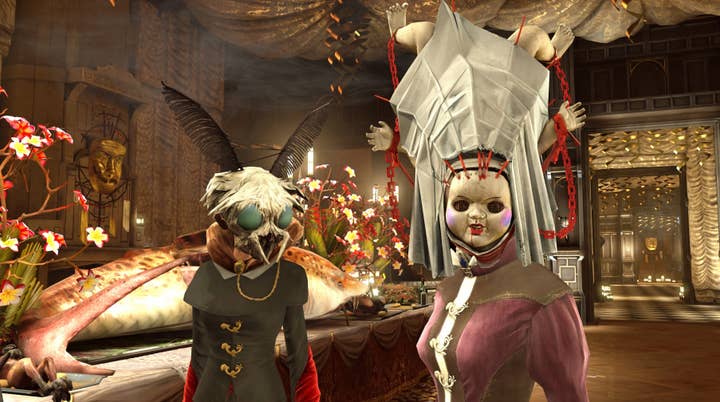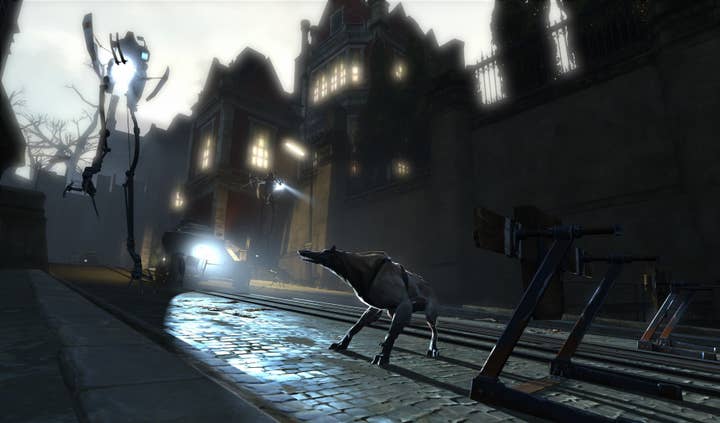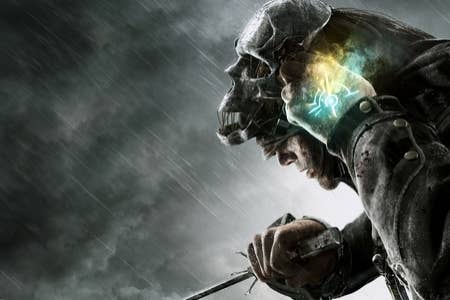Critical Consensus: Dishonored
Arkane's original IP delivers depth and innovation, but it slightly fumbles in story and execution
Purely in terms of its inspirations, Dishonored is a core gamer's dream. Across its swelling number of unanimously positive reviews a handful of iconic titles crop up again and again: Half-Life 2 echoes throughout its architecture and character designs; Bioshock is at the root of its ambient approach to storytelling; Thief: The Dark Project informs its steampunk aesthetic and stealth gameplay; Hitman: Blood Money's smorgasbord of options for taking down your mark are present and gleefully correct.
If Dishonored is something of a magpie, it has unusually fine and discriminating tastes. As Polygon's Arthur Gies points out, it "borrows and steals", but only from the classics, and the result is a refreshing tonic for the homogenous, focus-tested feel of so many AAA releases.
"The benefit of ignoring market-driven thinking shines throughout Dishonored's asymmetric story of politics and comeuppance," Gies writes in his 9 out of 10 review. "Dishonored's clear vision and thoughtful design choices make for an experience that feels different, new, and more importantly, uniquely engaging."
"Dishonored's clear vision and thoughtful design choices make for an experience that feels different, new, and more importantly, uniquely engaging"
Arthur Gies, Polygon
For most of you, that will come as something of a relief. Harvey Smith, Raphael Colantonio and their cohorts at Arkane Studios have made no secret of Dishonored's lineage, but its apparent originality in a year defined by third and fourth iterations has been a selling point since its marketing push began. Every review, without exception, acknowledges its success in this area, and Polygon is particularly impressed with how effectively the design pushes the player away from the gunplay that so many of its peers rely upon.
"Dishonored gives you weapons," Gies says, "but Corvo's equipment more often takes the form of tools, nudging you towards thoughtful tactics. Using Corvo's arsenal and constantly finding new ways to employ it and the supernatural abilities you can unlock made me feel smart, offering a sense of reward above the option of brute force.
"Brute force and direct violence are an option, and not just as a means of giving you enough rope to hang yourself with. Arkane wants you to experiment, to push... It's stunning how non-structured everything in Dishonored can appear from a level-design perspective, but as you experiment with your approach and case your targets, it's clear how much thought went into possible player action. Dishonored establishes a language of player possibility, fostering a "why not" attitude instead of focusing on relentless objective-driven design."

The city of Dunwall, Dishonored's plague-ridden location, is not an open-world. Rather, like Bioshock's Rapture, it is a series of self-contained but interconnected areas, each one packed with detail and potential both horizontally and - thanks to the player's magical abilities - vertically. The missions are all hand-crafted, and present a degree of freedom that so many games promise but very few ever deliver. For body textEurogamer's Dan Whitehead, Dishnored's "true sandboxes" are redolent of the focus evident in all aspects of the game.
"What's most noticeable is how narrow Dishonored is," he writes. "This is a ruthlessly focused game with no interest in the sort of meandering bloat that has crept into blockbusters as this hardware generation stretches out its twilight for another 12 months. There are no naval battles, no gimmicky co-op modes, no gameplay hubs to decorate and upgrade. There's just you, a small selection of gadgets and abilities, and levels that are true sandboxes: small, self-contained areas rich in possibilities... It's all about fully mastering the tools you have rather than constantly looking out for the next toy to play with."
The assassination targets handed to Corvo, the game's protagonist, will take you to a string of lavishly produced locations: a brash high-class brothel, for example, or a decadent masked ball, where your objectives are creative in both premise and possible resolutions. These moments are when Dishonored's various small innovations work in concert, and they define the game.
"This is a ruthlessly focused game with no interest in the sort of meandering bloat that has crept into blockbusters in this hardware generation"
Dan Whitehead, Eurogamer
At this point, it's worth pointing out that Eurogamer's review awards Dishonored an 8, placing it at the very bottom of the scoring trend. As such, while Whitehead agrees with the game's finer points, he has a few more bugbears than his peers who went with 9s and 10s. Principally, for all its smart design and production, Arkane's execution on the gameplay level doesn't quite reach the same standard. Dishonored is a hard game anyway, but its flaws, however minor, can often make it frustrating.
"Context-sensitive actions are needlessly fussy, as opening doors or teleporting to ledges requires a little too much shuffling around for the right prompt to appear. Frustrating and, under pressure, sometimes fatal.
"The AI of your opponents doesn't always hold up to scrutiny either, with guards sometimes spotting you from a long distance and other times remaining blissfully unaware of the black-clad figure crouching in their peripheral vision. Once alerted to your presence, their only instinct is to mob you, and should you evade them by ducking through a doorway, they won't think to check if you close the door behind you. On one occasion I actually had guards appear behind me in a room with only one exit, and it's common for bodies and thrown objects to lodge, juddering and twitching, in walls and floors."

Such matters are hardly uncommon in modern AAA development, though, and Dishonored sweetens its few bitter pills with some of the best art direction and world-building since Irrational's Bioshock. That's the view of the Edge hive-mind, at least, which gives Dishonored a 9 out of 10 in a review that, uncharacteristically, finds very very little to fault.
"Dishonored's city is drawn with breathtaking depth. Its art design might place it on the foundations of 19th century London, crowding its spaces with smokestacks, brick tenements and hulking factories, but it's also run through with forbidding fascist classicism as well as opulent baroque and art nouveau touches. And fantasy is never far away, brought to the fore by magic: fantastic contraptions, such as the curved-legged Tallboys, and a set of weird, vicious animals, including the sharp-toothed Hagfish and brutal Wolfhounds.
"Although you experience Dunwall broken into large but discrete chunks separated by loading screens, it's a place realised with a richness that few games have ever managed. There's a sense that there's history behind every detail, and indeed you'll discover far more about the place through the many texts spotting the levels, learning about the intricacies of whaling and the sinister workings of the quasi-religious Overseer order."
The same is true of the characters, all "expressive and stylised" weirdos designed to give as much personality as possible in the shortest amount of time. The voice cast, which includes famous actors like Susan Sarandon and Brad Dourif, helps to gloss over occasional cracks in the characters' relatively thin backstories.
"or a game full of memorable missions, the final outing, where skills honed over the previous 10-to-15 hours should be pushed to the max, is mostly boring"
Patrick Klepek, Giantbomb
"The people of Dishonored's world feel fully formed even with little exposition, and though most reveal themselves to be unscrupulous and venal, you always want to know more about them. There's little true evil here, just devouring weakness, and understanding motives becomes a natural part of planning the demise of your marks."
For Giantbomb's Patrick Klepek, however, Dishonored's story is the one area that truly lets the game down. His four-star review reads like a five until the final third, when disappointment at its "predictable" and vaguely explained plot creep in. Klepek acknowledges that Deus Ex, on which Harvey Smith played a key role, also had a "pretty silly" story, but the standards in 2012 are higher than they once were, as are the standards in virtually every other aspect of Dishonored.
"It's important players are able to tell their own gameplay story in Dishonored, since the story the game is trying to tell isn't great," he writes. "Much of what you will learn about the broader world comes from books scattered about, but not every book is unique. The passages begin repeating pretty quickly, which meant I usually stopped trying to find them at all.
"There are similar storytelling missteps throughout Dishonored. Graffiti repeats ad nauseum, as does idle dialogue. The line 'think you'll get your own squad after what happened last night?' comes up again and again, and does a terrific job of breaking any sense of immersion. For a world otherwise superbly realised, these moments prompted me to tune out.
"I suppose the story disappointment wouldn't sting so much if it didn't come hand-in-hand with the climax playing out poorly as gameplay, too. For a game full of memorable missions, the final outing, where skills honed over the previous 10-to-15 hours should be pushed to the max, is mostly boring. Dishonored also commits the frustrating storytelling sin of ending out of nowhere and without enough resolution.
"Fortunately, what comes before is so, so good."

